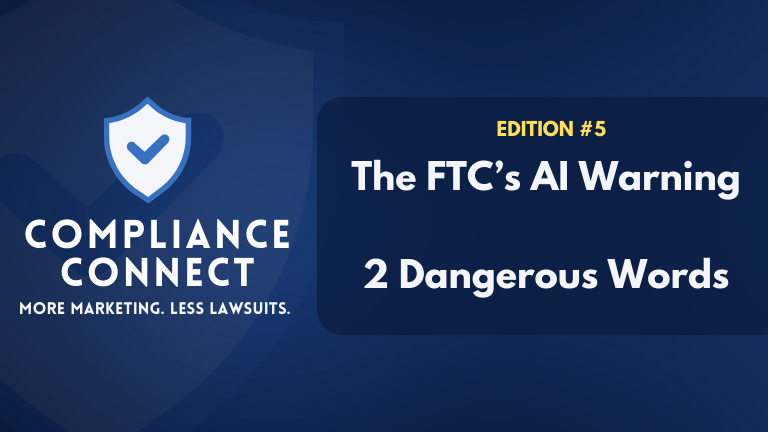Good morning! This is the fifth edition of the Compliant Connect newsletter.
The goal is simple: to keep you in the loop on what the FTC and other regulatory agencies are up to so that you can protect yourself.
These newsletters will land in your inbox twice a week – Mondays and Thursdays.
Remember: this is NOT legal advice, only information!
Here’s the rundown today…
- 🤖 The FTC Raises The Alarm About AI…
- 🎯 2 Words That Create A Compliance Time Bomb…
- 💬 Attorney Greg Answers Questions…
- ⏳ Is High-Tech Scarcity Compliant…
- 📝 How To Get Permission To Use A Testimonial…
- 🏡 Real Estate Earnings Claims…
Compliance Digest: What You Should Read Today
We wanted to share a couple of stories about how regulators are responding to AI…
The FTC Identifies Potential Harmful Effects Of AI
Both the FTC and the FCC is also trying to adapt their rules to new AI technology.
Remember, the FCC stands for the Federal Communications Commission and it is concerned with telephone, radio, television, and internet communications.
The FTC and the FCC collaborate on many issues.
Back in July, the FTC submitted comments to the FCC about how AI is being used to harm customers.
They reveal some of the CONCERNS that the FTC has with AI, and how they might regulate it in the future. Here are 3 of them…
#1 – Privacy
AI systems can pose serious privacy risks by misusing data and recordings.
For example, the FTC has acted against companies like Amazon and Ring for using voice recordings without adequate safeguards.
#2 – Fraud
AI voice cloning technology is being exploited for fraud, including scams like “grandparent scammers” cloning the voice of a loved one to request money, and phishing schemes using cloned executive voices.
One of the FTC’s suggestions is to deploy technology that can detect audio deepfakes in real time.
#3 – Discrimination
AI-based facial recognition systems have been found to disproportionately misidentify certain groups and put them under extra scrutiny.
Check out the press release and the full document to learn more.
The FTC Moves Against AI-Enabled Robocalls
Robocalls have been around for a LONG time. AI has taken them to the next level.
Instead of using pre-recorded messages, AI agents can have a dynamic conversation with a prospect while sounding like a human sales person.
In March, the FTC updated the Telemarketing Sales Rule to reaffirm that robocalls are banned using voice cloning technology.
They also extended these protections for B2B sales.
If your business is considering using voice cloning technology for sales calls, check out the full press release to see what is and is not allowed.

Ask Greg Mailbag #2
FTC attorney Greg Christiansen from Guardian Law periodically answers questions from members of our community.
Mace: “Love the book! With respect to the FTC and false deadlines/scarcity, what about when apps like Deadline Funnel are used which create an individual deadline for each prospect who won’t be able to purchase after their deadline expires? Is this problematic?”
As long as the customer cannot restart the timer and then still purchase.
In that case, it’s MISLEADING because in actuality there is not any real deadline. It’s all smoke and mirrors.
I have clients that have expiring offers, which legitimately end and clients cannot purchase after the time period given.
Richard: Sometimes, when I ask course community members if they are willing to sign a testimonial release, they simply reply that “you have my permission to use my testimonial” and don’t sign a release. Is that sufficient for me to use their testimonials? They did not give a signed testimonial release to those who run the course or the community.
It is risky not to obtain a written authorization to use their testimonial.
My release has BOTH an authorization component and a declaration that the information provided is truthful and accurate.
I also include a provision that they provided the information under penalty of perjury, meaning that legally they claim the statements are TRUE.
Furthermore, if you use testimonials with any “claims” (i.e., i made my first sale within a day of completing my training) you have to obtain external evidence (substantiation) to prove the accuracy of the statement.
The declaration is NOT sufficient to meet the substantiation provision.
Reader: Would this be considered an express earnings claim: “I can help you buy your dream home in 90 days or less if you follow everything I say.”
Without more context I’m not sure I can tell you.
If you are implying that if they join your course that they will have enough money in 90 days to build their dream home, then yes that is an earnings claim.
Unless you are teaching people how to construct homes, I don’t know how the statement would be compliant.
If YOU have any questions about the FTC, rules and regulations, compliance best practices, and more, please send your questions to support@naoac.com with the subject line Newsletter – Question For Greg
Did You Know…
The Telemarketing Sales Rule makes it ILLEGAL for a telemarketer to ask you to pay with…
- Remotely created payment orders or checks using your bank account information
- Cash-to-cash money transfers (ex. MoneyGram)
- PINs from cash reload cards (ex. MoneyPak)

“Goal Setting” Is A Compliance Time Bomb
In Greg’s opinion, the Lurn FTC case truly came down to just four words that were said on their sales calls:
“What is your goal?”
It seems pretty harmless to ask someone this. At least, that’s what most people think.
This question is asked on MANY sales scripts. Many of the top sales trainers suggest asking it as a form of “future pacing.”
The FTC hates it.
Greg has had FTC commission leaders specifically state:
“Do you set goals with your clients? Yes? Then that’s implied earnings claims and you’re violating the law.”
The Commission’s stance on this is that asking this question is a leading question.
When the prospect answers and you agree with their answer, you are giving them the “net impression” that they can easily attain those results.
You are committing to a result on behalf of the client that you have no substantiation or typicality study to back up.
Asking about goals on a phone call is DANGEROUS and turns the call into a compliance time bomb.
If the customer brings up a goal, it is the responsibility of the sales agent to go out of their way to correct the customer and assure them that there are no guarantees and that they are only providing them with education, resources and support.
Big takeaway: Check your sales scripts. If you see goal setting, remove it ASAP.
